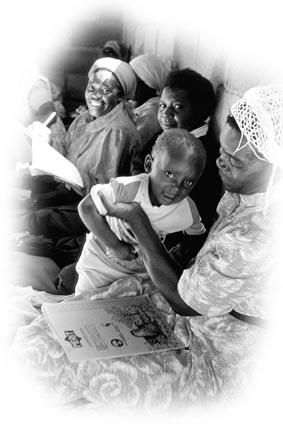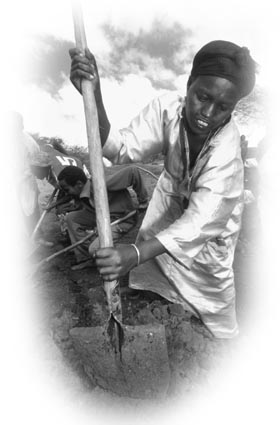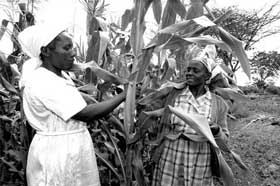
Its success depends on participation of African people
by Rogate R. Mshana

| Introduction Over the last four decades, Africa has been subjected to several development plans and declarations of intent. But, despite all these plans, equitable and sustainable development which focus on gender equality and eradication of poverty have not been achieved. African leaders have now come up with another plan called "The New Partnership for Africa's Development". While this plan has gained high international praise, the people of Africa, including labour unions, farmers, community-based organisations and NGOs were excluded during its formation. How can such a plan succeed without the full participation of the people of Africa? It has long been recognised that failure of development in Africa has mainly been due to the marginalisation of its people from decision-making on the one hand, and irresponsible government on the other. This new plan has put promotion of democracy and good governance as the first priority, yet the formation of the plan began without the full involvement of the people. This deficit is now the challenge to the African heads of states who formulated the initiative. The origin of NEPAD: Birth date: October 23, 2001 Birth place: Abuja, Nigeria Planners: African heads of state through their Implementation Committee, chaired by President Obasanjo, who adopted the revised October edition of the NEPAD Document. Proposed secretariat: Pretoria A conference on development of specific programmes, projects and financing for NEPAD took place in Dakar, Senegal, April 2002. Results are still minimal. The plan will be presented at the next Group of 8 summit meeting. NEPAD is needed because: • Mortality rate of children under 5 years of age is 140 per 1000; • Life expectancy at birth is only 54 years; • 42% of the population has no access to safe water; • The rate of illiteracy for people over 15 years of age is 41%; • There are only 18 mainline telephones per 1000 people in Africa compared with 146 for the world as a whole and 567 for high-income countries. What is at stake: Objective: Strategies: • They state the new political will and their resolve to spread democracy. “Across the continent, democracy is spreading, backed by the African Union (AU) which has shown a new resolve to deal with conflicts and censure deviation from the norm. One of NEPAD's foundations is the expansion of democratic frontiers and the deepening of the culture of human rights. • They set out the strategy; • Show programmes of action and an implementation plan. It is argued that the strength of NEPAD is its strong emphasis on democracy and governance which makes it different from the past attempts at fashioning Africa-wide initiatives for African development. But the plan shares certain features with past efforts. Like its predecessors, actions are discussed within a broad and general context. The leaders point out the following immediate priorities and "fast-tracking". Recognising the need to sequence and prioritise, the initiating presidents propose the following programmes to be fast-tracked, in collaboration with development partners: • Contagious diseases - HIV/AIDS, malaria and tuberculosis; • Information and communication technology; • Debt reduction; • Market access. The critique of NEPAD There were several attempts made by African leaders to produce plans but these were rejected or ignored by the international community. Will lessons learnt from previous plans improve NEPAD? A close look at the main components of NEPAD shows they are aimed at strengthening "public goods" and minimising "public bads". NEPAD finds itself, however, within unregulated globalisation, which is increasingly maximising "global bads". To regulate globalisation, priority should be given to the production, financing, management, and conservation of global public goods(1). At the global level, however, global public goods are part of a new agenda which was excluded from the UN Monterrey Conference on Financing for Development. Lack of global initiatives aimed at channelling financing to global public goods,(2) NEPAD will receive very little global financial support. |
|
| It is essential to outline the comparative advantage of NEPAD by asking a major question: "What could be better achieved at the global, regional, sub-regional, national and local levels?" The plan is ambiguous on this point. Similarly, it is not clear which actions can be well implemented by existing institutions and current sub-regional plans, and which actions require new institutions. While it is acknowledged that such an Africa-wide programme is bound to be general in nature due to the broadness and linkages of the continent's problems, specificity is essential in order to measure progress. Resource mobilisation is not specific either. What is known is that a Commonwealth Africa Investment Fund has been formed, and that the Development Bank of Southern Africa had already committed US$ 25million to NEPAD. Collaboration with the Finance Corporation of the World Bank is envisaged. |
 Training course for villagers, Zimbabwe © J. Maillard / ILO |
| NEPAD as a world view seems to have been informed by grossly misleading assumptions regarding: • Globalisation and Africa's position in it; • Causes of Africa's underdevelopment; • Poverty; • Its relationship with the dominant features of neo-liberalism: the Washington Consensus; • True meaning of development. As a charter or manifesto for designing the political-economic future of a continent whose ailments have been the subject of countless mis-diagnoses, mis-constructions, mis-prescriptions, and diversionary speculations, NEPAD has been a heads-of-state project, almost exclusively owned by the New African Leadership Group. Efforts of the New Leadership group to popularise it have ended up reinforcing the perception that it is little more than a marketing exercise, targeted at the multilateral donor community and the western bureaucratic elite. The main critique of NEPAD, which was also acknowledged by the president of Senegal Mr Wade, was the lack of participation of Africa's civil society. On a more ideological plane, civil society critics contend that NEPAD is an unquestioning endorsement of the neo-liberal framework for seeking uncritical integration into the world economy, and that such an endorsement, besides many other misgivings it may give rise to, fails to recognise that it seems to assign a subordinate role to the African economies in the current globalisation process. Globalisation, into which NEPAD would like to uncritically integrate the African economies, is increasingly revealing itself as a power system – a materialisation of the balance of hegemonic power – within which Africa has hardly staked a strategic position. |
|
| An ecumenical response The ecumenical family considers economic globalisation as an institutional expression of a powerful ideology - a system of beliefs and practices which, although claimed by its proponents to be universal, reflect a particular web of values dominated by western societies. Its values are western, not Christian.(3) These economic values are based on a belief that there can be a "totally free market" in which unregulated competing economic relationships of individuals in pursuit of their economic gains can lead to optimum good under the "invisible hand". The paradigm is preoccupied with growth while neglecting issues of equity and safeguarding of the environment. The World Council of Churches (WCC) has called for a paradigm shift, promotion of just trade and regulation of financial markets.(4) NEPAD was drawn up without a critical look at these economic globalisation elements, which shift resources from Africa to rich countries due to asymmetry in power relations (issues such as chronic unjust terms of trade, EU Agricultural subsidies [US 1 billion per day - whereas the majority of Africans live on less than a dollar a day, a cow is subsidised two dollars a day by EU, Africa trade agreements, Africa /US ] Africa Growth and Opportunity Act (AGOA), WTO trade imbalances, Debt and IMF-World Bank-related development and financial policies need to be addressed). |
 African people need to be involved in the development of their economy © Paul Jeffrey / ACT |
| The Southern African Catholic Bishops Conference (SACBC) has slammed NEPAD, saying the plan as a whole is ambiguous and some of its proposals, especially those relating to debates about economic globalisation, are dubious(5). NEPAD correctly states that current globalisation policies fail to lift Africa out of socio-economic decline, but then goes on to say that Africa therefore needs more of the same policies. The response of the Africa Task Force at the WCC “" to galvanise churches, national councils of churches, ecumenical organisations, networks, other faith-based communities and specialised bodies inside Africa into concerted action towards realising Africa's journey of hope and to enable Africa's churches to give spiritual leadership in Africa's renewal. It is also to galvanise the global ecumenical movement into accompanying Africa on this journey. Churches and ecumenical organisations who accept to participate in this programme will be those who firmly believe that Africa and Africans can, and are ready to, stir themselves into action that will bring hope, a productive and sustainable future for Africa's citizens." |
|
| The WCC seeks: • To facilitate the development of African thinking, initiatives and synergies for Africa's re-awakening. • To facilitate the mobilisation of African communities throughout the world to contribute to Africa's New Vision of the Future and to participate in the journey of hope. One of the strategies mentioned in the WCC's Special Focus on Africa is to engage churches and faith-based communities in Africa in the development and articulation of a proper response and input to the NEPAD leaders. It is now appropriate to organise, in conjunction with the authors of NEPAD, church consultations and workshops in Africa on the involvement of civil society in NEPAD and economic globalisation. It will be a serious mistake to believe that NEPAD could mainly depend on private financing from outside Africa. A serious analysis of the development of domestic markets, creation of a common Africa Union currency out of the current weak currencies in Africa, full utilisation of African human and other resources, and a strong Africa Economic Union are imperative before selling the current proposal of NEPAD to so-called investors. NEPAD should be African people-driven and -owned and not be owned only by heads of states with their so-called partners. The potential of NEPAD Rogate R. Mshana, programme executive in the Justice, Peace and Creation team of the WCC. Notes: 2. Public Finance is usually considered to have three major branches: the allocation branch, which consists of public policy measures for channeling resources to desired public goods; the distribution branch, responsible for facilitating macroeconomic stability, full employment, and price stability. Today, public goods which were once national public goods – clean air, public health, financial stability and market efficiency – have assumed cross-border dimensions due to forces of globalisation. To provide these goods to local constituencies, policy-makers can no longer rely solely on domestic policy measures, but need to engage in international cooperation. 3. See Richard Dickinson, Economic Globalization: Deepening Challenge for Christians, WCC-JPC, October 1998. 4.See Economic Globalization: A Critical View and An Alternative Vision: Program Implementation, WCC-JPC 2002. 5. See Bits on NEPAD, in Mail and Guardian (Johannesburg, March 8, 2002, posted to the Web March 7, 2002. |
 Rose Edward and Helen Waidimo of the women's group in Mutunyi, 300 km north of Nairobi, inspecting a small maize crop irrigated from a nearby spring. © Peter Williams / WCC
|
